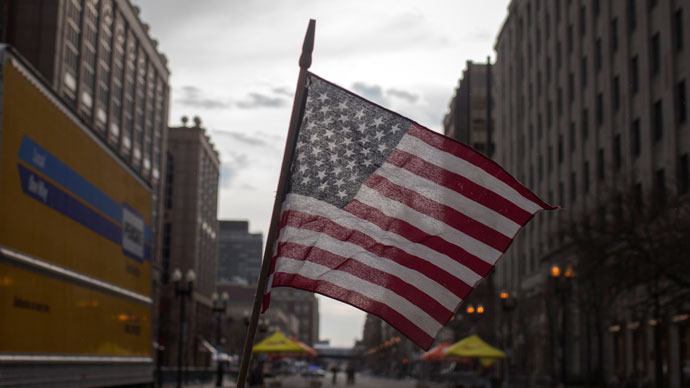Boston Backlash: Britain’s IRA terrorism experience holds lessons for US

As US media coverage feverishly highlights the looming threat of terrorism following the Boston Marathon bombings, former MI5 officer Annie Machon, cautions against too readily handing over basic freedoms for an elusive sense of security.
With its endless, speculative scaremongering about the Boston
attacks, the US media plays a diabolical role in furthering the
work of the attackers - ie terrorizing the population, inducing
them to live in a state of abject fear. Of course, once
suitably terrorized, the US people will be even more willing to
give away what remains of their historic freedoms, all in the name
of increasing their security.
Indeed, the abrogation of liberty in the USA has patently not
resulted in greater security, as Boston has so brutally
demonstrated. No society can protect itself absolutely against
terrorism.
In a democracy, just as rights come with responsibilities, so
freedoms come with risk. And we need to remember that those
freedoms were hard-won by our ancestors and will be equally
difficult to win back if we heedlessly throw them away now, while
the risks remain statistically negligible.
Successive US governments have already decimated the basic rights
of the US people in the post-9/11 security panic. At the sharp end,
people, both globally and now also in America, can be
extraordinarily rendered (kidnapped) to black prison sites and
tortured for years on the word of anonymous intelligence officers,
they can be denied due legal process, and they can be killed on
presidential decree by drone strikes - a real-world version of the snuff
video.
Additionally, the US has descended into a panoptical surveillance
state, with endemic data-mining of communications, airborne drone
spying, and the categorization of protesters as "domestic
extremists" or even "terrorists" who are then beaten up by
militarized police forces. This otiose security theatre constantly
reminds US citizens to be afraid, be very afraid, of the enemy
within.
Terrorist atrocities are criminal acts, they are not a separate
form of "eviltude", to use George Bush-era
terminology. As such, the criminals behind such attacks
should be investigated, evidence gathered, and they should be tried
in front of a jury of their peers, where justice can be done and be
seen to be done. So it is troubling that the Boston FBI bureau
chief, Richard DesLauriers, is today quoted in the New York Times as saying he
is working on "a criminal investigation that is a potential
terrorist investigation". The precise difference being?
Likewise, terrorist attacks are not an existential threat to the fabric of
the nation, even events on the scale of 9/11. However, I
would suggest that the response of the security-industrial complex
poses a greater existential threat to the future well-being of the
USA. The post-9/11 security crackdown in the USA has eroded core
democratic values, while the military response across the Middle
East has bankrupted America and created a generation of potential
enemies.
But it doesn't have to be this way. Compare and contrast the
response of the Norwegian people in the aftermath of the terrorist
attacks and murder of 77 people by Anders Breivik. As a country,
there was a need to see justice done, but not to allow such an
appalling attack to compromise the values of the society and
destroy a cherished way of life for all. And this the
Norwegian people achieved.
Similarly between the late 1980s and the late 1990s the UK endured
Lockerbie, Bishopsgate, Canary Wharf, and Manchester, to name but a few major atrocities.
A good summary of the terrorist attacks against London alone over
the last 150 years can be found here, with the first Tube bombing occurring in
1885. A pilot, Patrick Smith, also recently wrote a great article about aircraft security and the
sheer scale of the terrorist threat to the West in the 1980s — and
asks a very pertinent question: just how would we collectively
react to such a stream of atrocities now?
During the 1990s, at the height of the Provisional IRA's bombing
campaign on mainland Britain, I lived in central London and worked
as an intelligence officer for the UK's domestic Security Service
(MI5). Putting aside my professional life, I have personal memories
of what it was like to live under the shadow of terrorism. I
remember making my way to work in 1991 and commuting through
Victoria train station in London 10 minutes before a bomb, planted
in a rubbish bin, exploded on the station concourse. One person
was killed, and many sustained severe injuries. One person
had their foot blown off — the image haunted me for a long
time.
I also vividly remember, two years later, sitting at my desk in
MI5’s Mayfair office, and hearing a dull thud in the background —
this turned out to be a bomb
exploding outside Harrods department store in
Knightsbridge. And let’s not forget the almost daily
disruption to the tube and rail networks during the 1990s because
of security alerts. Every Londoner was exhorted to watch out
for, and report, any suspicious packages left at stations or on
streets.
Londoners grew used to such inconvenience, they grumbled a bit
about the disruption and then got on with their lives — echoes of
the “keep calm and carry on” mentality that evolved during
the Blitz years. In the 1990s the only noticeable change to
London’s diurnal rhythm was that there were fewer US tourists
clogging up the streets — an early indication of the
disproportionate, paranoid US reaction to a perceived terrorist
threat.
In contrast to the post-9/11 years, the UK did not then react by
shredding the basic freedoms of its people. There were
certainly controversial cases and heated debates about how long you
could hold a terrorist suspect without charge, but the way of life
continued much as before. Now, twelve years after 9/11 - an attack
on a different continent - the UK has all the laws in place to
enact a de facto police state within days.
Life and liberty are both precious. It is always tragic when lives
are lost in the name of some twisted or arcane political cause; it
is even more tragic when the liberty of all is also lost as a
result.
My heart goes out to those who were injured and to the friends and
families who have lost loved ones in the Boston attacks, in the
same way it goes out to all those who were killed and maimed across
the Middle East yesterday.
However, I do urge caution in the US response; evidence needs to be
gathered and justice seen to be done. Another security crackdown on
a fearful US population will hurt Americans much more than two
bombs in Boston ever could, while yet more remotely-controlled
revenge killings across the Middle East will kill, maim and
displace many more thousands.
I shall leave you with a quote from another great American, Thomas
Jefferson:
"Single acts of tyranny may be ascribed to the accidental opinion
of the day; but a series of oppressions, begun at a distinguished
period, and pursued unalterably through every change of ministers
too plainly proves a deliberate, systematic plan of reducing us to
slavery."
The statements, views and opinions expressed in this column are solely those of the author and do not necessarily represent those of RT.
The statements, views and opinions expressed in this column are solely those of the author and do not necessarily represent those of RT.













